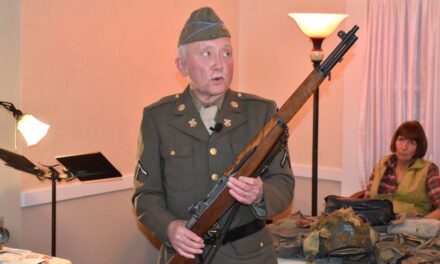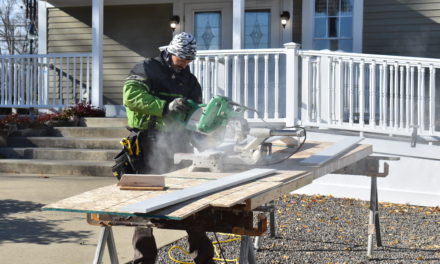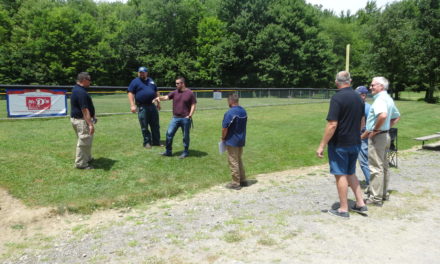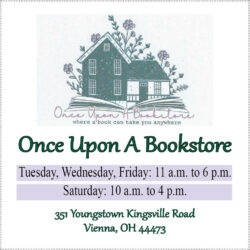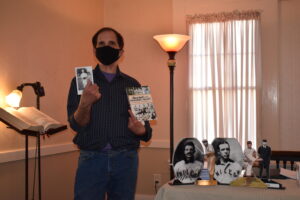
Paul Kovach holds a photo of himself as a boy and copy of his book, “Baseball in the Mahoning Valley.”
As a 5-year-old boy, Paul M. Kovach got a baseball uniform and, boy, was he proud.
But, he also was a precocious reader.
“I told my mother, ‘Someday I’m gonna write a book about baseball,’” he said of the day he got the uniform.
His mother thought he should aspire to something a little more substantial, like being president of the United States.
Nothing doing with this Niles preschooler.
“It didn’t get any better than that,” Kovach said of writing a book about baseball. “That was the pinnacle of what you could aspire to. That’s a 5-year-old mind for you.”
Kovach has finally reached that pinnacle with the publication of his book, “Baseball in the Mahoning Valley: From Pioneers to the Scrappers.”
The book starts in 1883 when Youngstown and Niles both had teams of renown. The Youngstown Puddlers boasted five players who later made it to the big leagues: Youngstown native Jimmy McAleer, Pit Gilman, Ed “Jumbo” Cartwright, Sim Bullas and Charlie Ingram.
“He probably should be in the hall of fame,” Kovach said of McAleer. “He was in baseball as a player, administrator, he was an owner, and everything in between. The American League would not be the American League if not for him. He was also the first manager of the Cleveland Indians in 1901.”
The Niles Grays featured a multi-position player who would eventually make it into the National Baseball Hall of Fame and Museum – Bud Fowler, who is believed to have been the first professional African-American player.
Fowler, who also played in New Castle, started his career in 1872, but the 1883 season was his first in which he stayed with one team. Racism within baseball led to many teammates refusing to play with him, but abolitionist sentiment in Niles remained strong even nearly 20 years after the Civil War, Kovach said.
The Niles team disbanded the next year after the city of Niles suffered an economic crisis brought on by the drop in prices for railroad rails. A man at the center of Niles banking and business, Anson G. Bentley, was a native of Brookfield and figures prominently in Kovach’s story, even if his ties to baseball are tenuous.
“He was a miner, a ’49er,” Kovach said at an April meeting of the Brookfield Historical Society. “He went to California in 1848-1849. He came back fabulously wealthy. It’s kind of obscure how he got his money, because everybody knows he was destitute when he left.”
The Niles team played the Cleveland Blues – a precursor to the Cleveland Guardians – during its one season, and the Youngstown team did so a year later. Ties between the Mahoning Valley and professional baseball in Cleveland are numerous, Kovach said.
Other prominent figures in the book are Red Ames, a Niles native who won 183 games as a big-league pitcher; Joe “Iron Man” McGinnity, the New York Giants pitcher brought in as a ringer for a Niles team that was facing a rival Youngstown squad; and Harry M. Stevens, a native of England who came to Niles for work and built an empire selling baseball scorecards and handling concessions in several big-league parks. Stevens popularized the hot dog and the use of the straw.
The book devotes several chapters to the Mahoning Valley Scrappers, the minor-league baseball team based in Niles that for much of its life was an affiliate of the Guardians. Players who have come through the Scrappers include C.C. Sabathia, Victor Martinez, Shane Bieber, Jason Kipnis and Jose Ramirez.
Through the editing process, Kovach had to leave out significant chunks of Mahoning Valley baseball history, such as many of the industry teams that fiercely competed for local bragging rights; stars such as George Shuba, who played with Jackie Robinson on the Brooklyn Dodgers; and local fields such as Masury’s Elks Field, where Babe Ruth, Casey Stengel and Negro League teams played on barnstorming tours.
“Baseball in the area, one book cannot cover it,” Kovach said. “Two books cannot cover it. I’m hoping to get three.”
While whether he will get to write any more books is an open question much tied to sales of “Baseball in the Mahoning Valley,” “It was a fun write,” he said. “I hope it’ll be a fun read.”
“Baseball in the Mahoning Valley” is available at the Trumbull County Historical Society gift shop in Warren, and online through retailers such as Barnes and Noble and Target, and Arcadia Publishing.

